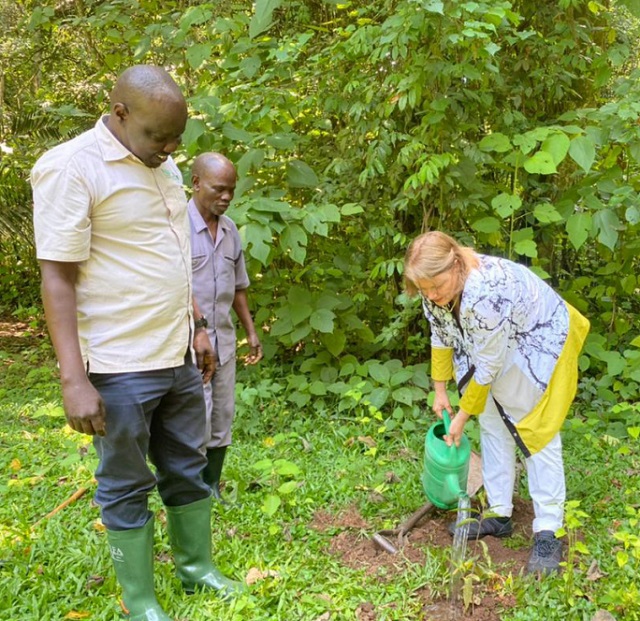
Forest Reserve while on an excursion on
Oct.08. COURTESY PHOTO
The financing question
Uganda and other developing countries will be watching proceedings at this year’s COP26 in Glasgow, Scotland, with keen interest as the issue of finance for climate change action gains more traction.
Developed countries have in the past pledged to mobilise US$ 100 billion annually in climate finance for poor countries that are struggling to cope with climate change effects. But, the OECD and Oxfam, a global campaigner against injustice and poverty, have noted how rich countries have been off-track to fulfill their commitments.
Billions of dollars are required by low and middle income states like Uganda to respond to the ever rising impacts of climate change. The financial resources are desperately needed to build climate resilience.
Rogan said COP26 is taking place against a backdrop of several big crises which are all interrelated; the climate change crisis, the COVID-19 crisis, the economic crisis caused by those two and of course a development crisis since everything has been set back during COVID.
“We also have the oil and energy crisis going on around the world and many countries are still suffering from security and conflict crises which are disrupting the lives of people,” she added.
But, Rogan said the Uganda government is yet to revise, update and submit its Nationally Determined Contributions (NDCs) to the UN.
“This is very last minute and I urge the government to submit its report to the UN by Oct.12 so it can be included in the UN’s synthesis report for us to discuss during COP26 in November,” she said.
The NDCs are national climate plans highlighting climate actions, including climate related targets, policies and measures governments aim to implement. Uganda’s NDCs are designed around building a low-carbon development pathway and reduction of the vulnerability of the population now estimated at 42 million.
The government has come up with measures and policies that build resilience in the energy, transport, agriculture, waste, forestry and wetlands. Similar adaptation strategies have been made targeting the agriculture, livestock, and forestry, infrastructure, water, and energy and health sectors. But marshalling financial resources to implement Uganda’s climate mitigation and adaptation strategy remains a challenge.
Rogan said within the aspect of adaptation, every country is already feeling the impacts of changes in climate.
Uganda, which is already the 12th most vulnerable country in the world, has already experienced changes in the rainfall patterns, deforestation, soil degradation and drought in some areas.
“We need to adapt our ways of working and living to take account of these changes but also prevent further bad changes from happening,” she said, “We need to build resilience at all levels right from the grassroots and the communities. All this costs money so our third priority for the conference is financing.”
Rogan said the UK also intends to push the developed countries to meet the target of US$100 billion contribution for climate adaptation every year for developing countries that was promised in 2015.
“We have never met that target but we will be pushing very hard to make sure that target is met in November at the COP26. We want to make sure that climate financing is more accessible,” she said.
“We have heard and it is very frustrating that many poor countries have not been able to get financing even when it is made available because the processes are very complicated, take too long and are very heavy. So we are trying to find ways to make sure finance is more accessible because we want the money flowing.”
Sam Cheptoris, Uganda’s Minister of Water and Environment made the same point when he spoke on Sept.27 during the Africa Climate Week that Uganda hosted.
“If nothing changed, this would lead to a generational crisis for Africa,” he said.
And in perhaps a sign of what is most likely to shape discussions at COP26 in Glasgow, Hafez Ghanem, the Vice President for Eastern and Southern Africa at the World Bank Group, noted how over the next five years, the World Bank is looking at committing 35% of financing to climate action.
The financing, he said, would go into supporting national action and economy-wide approaches to align planning and policy with action to achieve a sustainable, low-carbon and resilient future.
Al Hamdou Dorsouma, the Acting Director of the Climate Change and Green Growth Department at the African Development Bank, also noted how the African Development Bank stands ready to deploy its resources to save people and planet and generate wealth for the African Continent. It remains to be seen how this will be done.
****
 The Independent Uganda: You get the Truth we Pay the Price
The Independent Uganda: You get the Truth we Pay the Price





